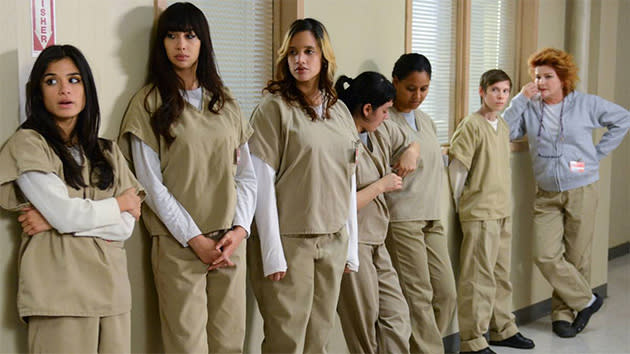Is ‘Orange is the New Black’ Really A Comedy? The Bizarre Category Rules of the Emmy Awards

Fans of "Orange is the New Black" can breathe easy: the Netflix series has (rightfully!) earned an Emmy nomination for Outstanding Comedy Series. Great! But wait -- what?
"Orange is the New Black" is an Outstanding Comedy Series? No. Not a show about women who've dealt (and are dealing with ) with physical and sexual abuse to mental health issues to domestic violence to racism (and more) in a prison.
Sure, "OITNB" has its funny (very funny) moments. But it's also an extremely serious and, at time, incredibly dark show. How can the Emmy Awards consider it a comedy?
Here's How It Happens

Well, it's easy: networks want as many of their shows as possible to win Emmys. So, predictably, Netflix submitted "House of Cards" for Outstanding Drama Series, while "Orange is the New Black" used funny moments like "I threw my pie for you" to justify aligning itself with shows like "Louie," "Modern Family," "Silicon Valley," "Veep," and "The Big Bang Theory." That way, the most popular of Netflix's original shows wouldn't compete against each other for Emmy statuettes.
But while the "OITNB" obviously deserves awards, acclaim, and huge levels of kudos, was it really "funny" enough to beat out shows like "Broad City," "Parks and Recreation," or "The Mindy Project"? Frankly... no, it's not. (Hey, it shouldn't be considered a comedy if you cry at some point almost every episode and/or get so stressed about plot developments that you can't sleep.)
Awards Mean Prestige, Which Means Viewers

But the more award nominations and wins a network rakes up, the better it is for programming, for ratings, and the future of production. It's also an old tactic: in 2005, ABC submitted "Desperate Housewives" to the comedy category so that "Lost" could still win for Outstanding Drama Series (which it did). Submitting to more categories mean more chances of winning.
But this is where the nomination process stops making sense: "American Horror Story" is still nominated for "Outstanding Miniseries," while "True Detective" (a show that operates under the same system of telling a self-contained story over a smattering of episodes) has been included under the "Outstanding Drama Series" umbrella. When it comes to the Emmys, "consistency" isn't exactly their mandate.
The Definitions Are Contradictory at Best

According to the official Emmy definition of a miniseries (thank you, Vulture), "A miniseries is based on a single theme, or a storyline, which is resolved within the piece. In a single awards year, all of the parts must be presented under the same title and have the continuity of production supervision. A miniseries consists of two or more episodes with a total running time of at least four broadcast hours."
However, if the show includes a "created by" credit (in "True Detective's" case, there is a "created by Nic Pizzolatto" credit), it is not allowed to compete in the miniseries category unless they get special permission from the academy. That's what "American Horror Story" creator Ryan Murphy did, presumably so that he would face less competition than he would in the Outstanding Drama Series category. Why Pizzolatto didn't do this for "True Detective" is a bit of a mystery, but perhaps it was because many believe his show actually has the potential to defeat favourites like "Breaking Bad" or "Game of Thrones" on Emmy night.
Just Kidding: The Definitions Just Don't Work Anymore

Confused yet? Try this on for size: in the official Emmy nomination PDF, Outstanding Comedy and Outstanding Drama are paired together, and are defined as "programs with multiple episodes (minimum of six), where the majority of running time of at least six of the total eligible episodes are primarily comedic for comedic series entries, or primarily dramatic for dramatic series."
Wow! That really cleared it up, huh? (Sigh.)
Apparently, if the submitters want to submit something as a comedy, then it's a comedy, and as long as the Emmy voters think something's funny, it's funny. And that's why, according to this year's Emmy nominations, "Orange is the New Black" is considered a comedy.

Don't misunderstand: "OITNB" is fantastic, and is beyond deserving in terms of recognition and accolades -- it's an important series that's given us a glimpse into a very harsh reality for millions of people. But it's not a comedy. It's funny in the way that life is funny when everything else is going horribly awry. (You know, when we're laughing through many, many tears.) And arguably, crediting the series as a comedy is a disservice not only to the show itself, but to other actual comedy series that are deserving of recognition. (Like "Brooklyn-Nine-Nine," which was mostly ignored by the Emmys, despite winning for comedy series at this year's Golden Globes.)
Sure, this move might grant Netflix more award nominations and wins, but "Orange is the New Black" should've been given a chance to contend amongst series like "Breaking Bad" and "Mad Men." It's good enough. It's good enough to be called what it is: a drama that sometimes makes us laugh.
Or maybe it's time for the Emmys to realize that television has evolved beyond the black-and-white-categorization of "drama" and "comedy." Heck, last year's Outstanding Drama Series winner "Breaking Bad" was occasionally one of the funniest shows on television, and Louis C.K.'s "Louie" has some of the most thought-provoking writing we've seen in years. Maybe all of the main Emmy categories need a makeover.
If the Emmys aren't willing to adapt to the way television is changing, then maybe it's time for us to adapt ourselves and focus on different, more astute award shows -- like ones that don't keep snubbing "Orphan Black" star Tatiana Maslany, maybe?


